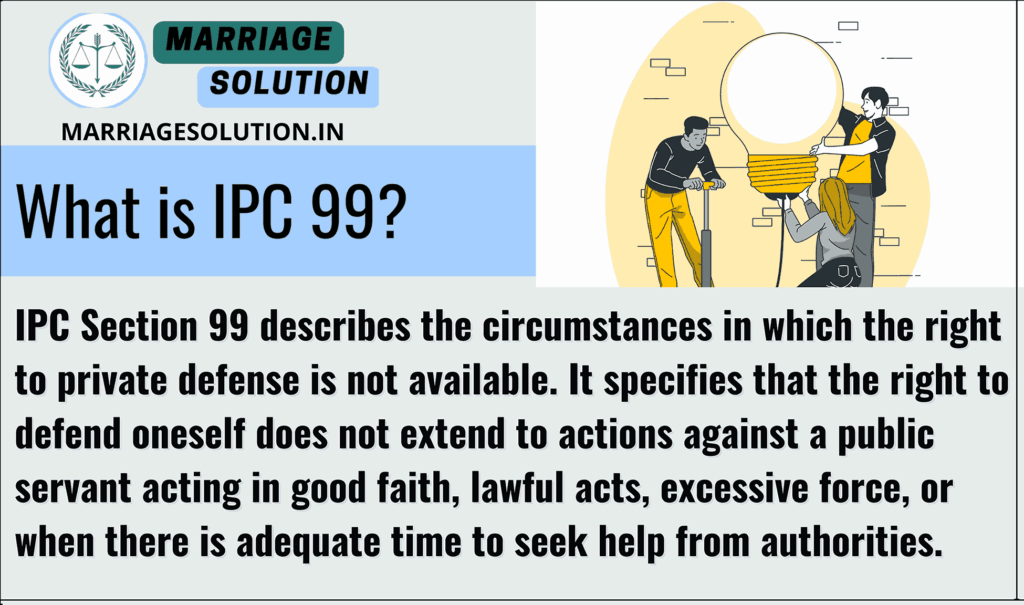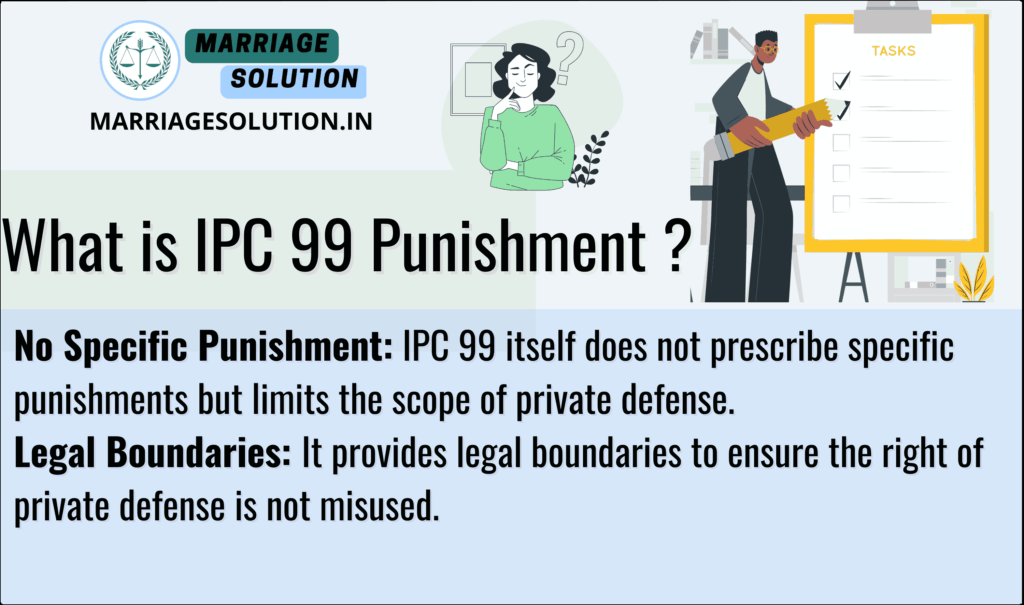Introduction of IPC 99
IPC Section 99 deals with the offense of intentionally giving public grounds to believe that an act has been committed which may cause a person to be arrested or property seized. It aims to prevent public mischief arising from false public assertions that could trigger law enforcement action unnecessarily.
What is IPC Section 99 ?
IPC Section 99 describes the circumstances in which the right to private defense is not available. It specifies that the right to defend oneself does not extend to actions against a public servant acting in good faith, lawful acts, excessive force, or when there is adequate time to seek help from authorities.

IPC Section 99 Overview
IPC Section 99 makes it a criminal offense to give public grounds through words, conduct or other means to believe that an offense punishable with imprisonment has been committed, knowing this representation to be false. The key aspect is the public nature of the assertion about an alleged offense.
- Introduction to IPC Section 99
This section talks about the limits on when you can use self-defense or defend your property. It lays out the situations where you cannot claim self-defense as a legal justification for your actions. - When Private Defense is Not Applicable
You cannot use self-defense against a public servant like a police officer or government official who is doing their job in good faith, even if their actions may not fully follow the law. Their position gives them certain legal protections. - No Private Defense Against Lawful Acts
If someone is doing something that is allowed by law, you cannot use force to stop them, even if their lawful actions cause you some harm or inconvenience. The law protects their right to do lawful things. - Proportionate Force Only
If you do use self-defense, the amount of force you use must match the level of threat you faced. You cannot use excessive or disproportionate force beyond what was reasonably needed to defend yourself. - No Private Defense if Time for Help
If you have enough time to get help from authorities like the police, you cannot claim self-defense. You must try to get legal help if the situation allows instead of taking matters into your own hands. - Ensuring Balance
Overall, this section tries to balance the right to legally defend yourself with preventing misuse or abuse of that right. It stops people from using self-defense as an excuse for unlawful violence when other options were available.
IPC 99 Punishment
No Specific Punishment: IPC 99 itself does not prescribe specific punishments but limits the scope of private defense.
Legal Boundaries: It provides legal boundaries to ensure the right of private defense is not misused.
Proportionate Force: Emphasizes that any force used must be proportionate and reasonable.

99 IPC bailable or not ?
IPC Section 99 does not directly involve bailable or non-bailable offenses as it deals with the limitations on the right of private defense. It provides a framework to ensure that the right of private defense is not exercised inappropriately.
Section 99 IPC case laws
Section 99 of IPC: Restrictions on the Right of Private Defence
1. State of UP v. Ram Swarup (1974)
- Facts: The accused, Ram Swarup, used force against a public servant who was acting under the color of his office.
- Issue: Whether the use of force against a public servant was justified under the right of private defense.
- Judgment: The court held that the accused could not claim the right of private defense.
- Rationale: The public servant was acting in good faith under the color of his office, and IPC 99 restricts the right of private defense in such cases.
- Significance: This case reinforced the limitation on the right of private defense against public servants acting in their official capacity.
2. Kishan v. State of Maharashtra (1981)
- Facts: Kishan used excessive force while defending himself against an unarmed aggressor.
- Issue: Whether the force used was proportionate and justified under IPC 99.
- Judgment: The court ruled against Kishan, stating the force was excessive.
- Rationale: IPC 99 requires that the force used in self-defense must be proportionate to the threat faced.
- Significance: Highlighted the importance of using reasonable force in self-defense situations.
3. Bachcha Singh v. State of Bihar (1990)
- Facts: The accused killed an intruder who was stealing crops from his field.
- Issue: Whether killing the intruder was justified under the right of private defense.
- Judgment: The court held that the act was not justified.
- Rationale: The threat to property did not justify lethal force; IPC 99 limits the extent of force used in protecting property.
- Significance: Clarified that lethal force is not justified in protecting property unless there is an imminent threat to life.
4. Ranbir Singh v. State of Haryana (1983)
- Facts: Ranbir Singh attacked a public servant who was trying to arrest him.
- Issue: Whether the use of force was justified against the public servant.
- Judgment: The court ruled that the right of private defense was not applicable.
- Rationale: The public servant was acting in good faith, and IPC 99 prohibits private defense against such acts.
- Significance: Reinforced the protection given to public servants acting in their official duties.
5. Shyam Sunder v. State of Rajasthan (2001)
- Facts: The accused used force to prevent a lawful eviction from his property.
- Issue: Whether the right of private defense applied in this situation.
- Judgment: The court held that the right of private defense did not apply.
- Rationale: The eviction was lawful, and IPC 99 restricts the right of private defense against lawful acts.
- Significance: Emphasized that lawful acts cannot be resisted under the guise of private defense.
6. Ratan Lal v. State of MP (1965)
- Facts: Ratan Lal inflicted injuries on a thief who was attempting to steal his livestock.
- Issue: Whether the injuries inflicted were proportionate to the threat faced.
- Judgment: The court ruled in favor of Ratan Lal.
- Rationale: The force used was deemed reasonable and necessary to protect his property.
- Significance: Demonstrated that proportionate force can be justified in defending property.
7. Dev Raj v. State of Punjab (1998)
- Facts: Dev Raj attacked a neighbor during a property dispute.
- Issue: Whether the right of private defense could be claimed in a property dispute.
- Judgment: The court ruled against Dev Raj.
- Rationale: The dispute did not pose an imminent threat, and IPC 99 restricts private defense when legal remedies are available.
- Significance: Highlighted that legal channels should be pursued in property disputes.
8. Lakshmi v. State of Tamil Nadu (1977)
- Facts: Lakshmi injured a mentally unstable person who was attacking her child.
- Issue: Whether the force used was justified under IPC 99.
- Judgment: The court acquitted Lakshmi.
- Rationale: The force used was reasonable and necessary to protect her child from harm.
- Significance: Reinforced that reasonable force is justified in protecting others from immediate danger.
9. Harish Chandra v. State of Rajasthan (2005)
- Facts: Harish Chandra used force against a person who was attempting to burn his crops.
- Issue: Whether the use of force was justified in protecting property.
- Judgment: The court ruled in favor of Harish Chandra.
- Rationale: The force used was proportionate and necessary to prevent significant damage to his property.
- Significance: Highlighted that proportional force is acceptable in protecting property from significant harm.
10. Prem Singh v. State of Himachal Pradesh (1992)
- Facts: Prem Singh attacked a public servant who was demolishing his illegal structure.
- Issue: Whether the right of private defense applied in this situation.
- Judgment: The court ruled against Prem Singh.
- Rationale: The demolition was a lawful act by a public servant, and IPC 99 restricts the right of private defense in such cases.
- Significance: Reinforced that private defense cannot be used to obstruct lawful duties of public servants.
Section 99 IPC in short information
| Offence | Definition | Punishment | Bailable or Not |
|---|---|---|---|
| Limitations on Private Defense | Specifies situations where the right to private defense is restricted | No specific punishment | Not applicable (provision for self-defense limitations) |
IPC 99 FAQs
What is IPC Section 99?
IPC Section 99 outlines the limitations on the right of private defense, specifying situations where this right cannot be exercised.
Can I use private defense against a public servant?
No, you cannot use private defense against actions taken by a public servant acting in good faith under their office.
Is excessive force allowed under IPC 99?
No, the force used in private defense must be proportionate to the threat faced. Excessive force is not justified.
What if there is time to seek help?
If there is enough time to seek help from public authorities, the right of private defense is not applicable.
Why are there limitations on private defense?
The limitations ensure that the right of private defense is not misused and that individuals do not take the law into their own hands unnecessarily.
If you need support with court proceedings or any other legal matters, don’t hesitate to reach out for assistance.
Court or any other marriage-related issues, our https://marriagesolution.in/lawyer-help-1/ website may prove helpful. By completing our enquiry form and submitting it online, we can provide customized guidance to navigate through the process effectively. Don’t hesitate to contact us for personalized solutions; we are here to assist you whenever necessary!
